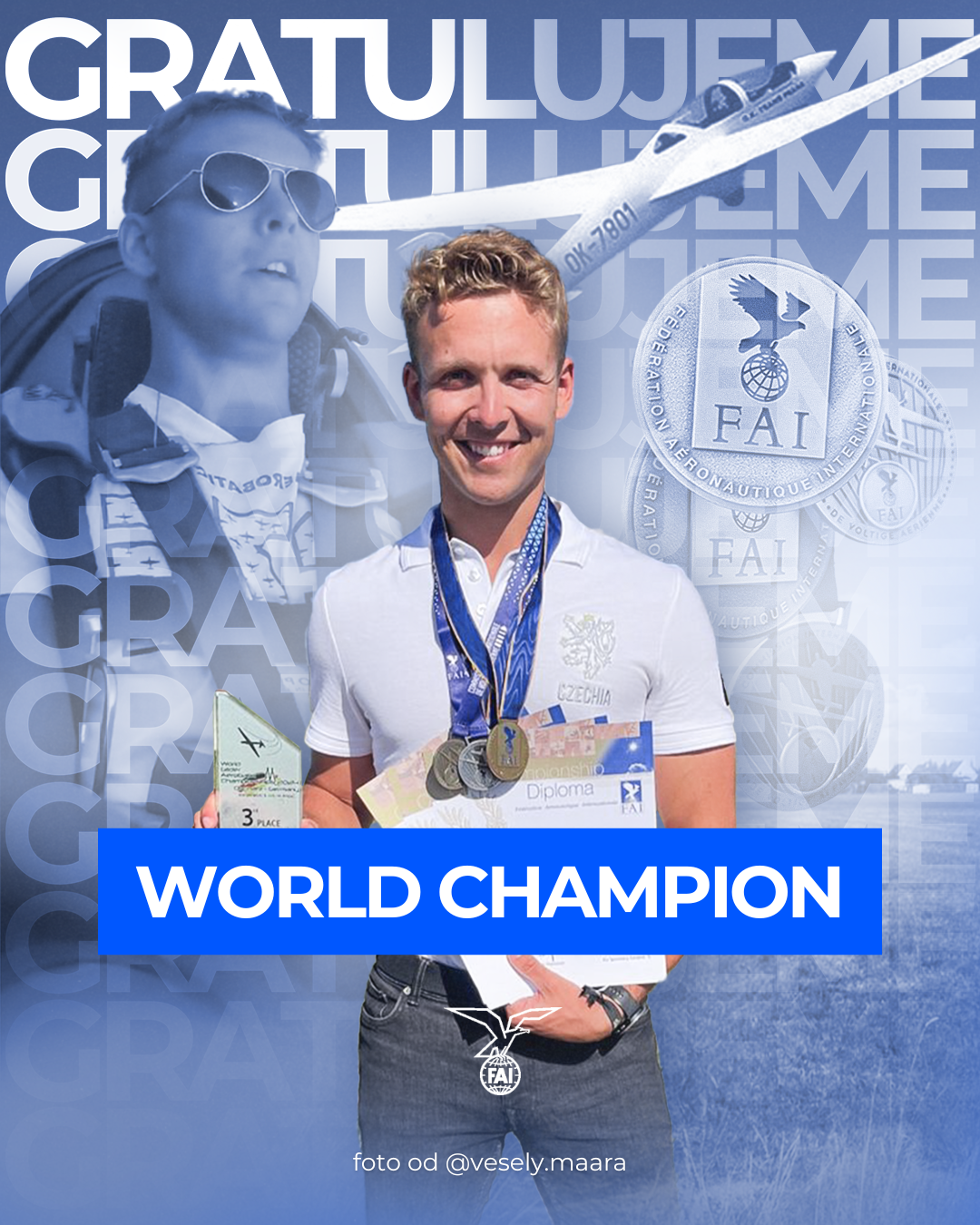Marek Veselý brings home gold, two silver, and a bronze medal from the World Aerobatic Championship.
Marek Veselý, a young promising pilot represented by JANDASPORT® , brings home the most prestigious medal from the World Aerobatic Championship. In addition, Marek also flew his way to two silver and one bronze medal.
We had a short interview with Marek, where he shared some interesting insights from his journey to becoming the Junior World Champion.
What were the biggest challenges you faced during training and at the World Championship?
Since I didn't have much time or resources to train this year, the biggest challenge was definitely to train as efficiently as possible and to try all the difficult elements at least once that I could encounter at the World Championship.
As for the World Championship, the biggest challenges are always related to maintaining focus. Aerobatics is not just about flying and controlling the aircraft. It’s largely about mental strength and the mindset of each of us. Another challenge was one of the competition sequences, which consisted of difficult maneuvers. In the final maneuver, you had to fly straight towards the ground at a low altitude, and I must say I really didn’t like it and didn’t feel comfortable. In the end, I managed to handle it and even got great scores, so for me, the challenge was met.
Which moments from the World Championship will stay with you forever and why?
It will definitely be that one challenging sequence and how excited I was that I managed to do it and survived 🙂 But it's important to say that aerobatics and aviation as a whole are not just about specific flights, but also about the people around, the morale, and I dare say, a certain culture or lifestyle. Thanks to this, there are plenty of experiences and memories to last a lifetime.
What do the gold medals mean to you, and how have they influenced your career in aerobatic flying?
Indescribable. I don't really care if it's a gold medal from a regional competition, a 6th Czech Championship title, or a gold from the World Championship. In aviation, you never know how long you’ll be able to keep flying, whether due to finances, health, or anything else. So I consider every flight and every medal a great gift, and I accept it with gratitude and humility. Of course, if we’re talking about a gold medal from the World Championship, there’s something extra in it because I want to be the best pilot in the world, and these medals are proof that I’m on the right track and have what it takes.

Photo: JANDASPORT®
Marek Veselý.
A talented pilot who has already achieved:
- 7x Mistrovství ČR
- Gold at the World Championship in the Junior Advanced category
- Silver at the World Championship in Unknown Programs
- Silver at the World Championship in Teams
- Bronze at the World Championship in Overall Rankings
What do you think is key to success in aerobatic flying?
Besides determination, desire, mindset, hard work, and a positive attitude—which applies to all sports—this sport is greatly influenced by finances. If you don’t have the money, you can’t train, and without training, you can’t improve and be the best.
What does your training routine look like?
For maintaining physical fitness, I go running and regularly visit the gym. During flight, a person experiences G-forces from all directions, so it’s essential to have strong core muscles and a healthy heart to cope with these forces.
As for the flying itself, I try to train as much as possible. However, I don't fly more than four training flights a day because it becomes counterproductive.
What goes through your mind when you’re in the air performing aerobatic maneuvers?
There are many thoughts running through my mind, depending on various factors. During some simpler figures, I try to just enjoy it or think about where I am in relation to the audience or judges. During more challenging maneuvers, I monitor my speed and altitude, think about how and when to start managing the G-forces that will or are already affecting me. I often think about how I want to finish the maneuver so I can smoothly transition to the next one.
What gives you the courage to try new and more challenging maneuvers?
Courage? I think it’s because I’m obsessed with it and I want to be the best. In such a case, there's no room for fear. It’s more important to maintain a certain amount of respect and humility so that you don’t push too far and end up in undesirable situations.
Do you have any pre-flight rituals?
I don’t know if you could call it a ritual, but I like to wash or at least wipe down the plane before a flight. The plane flies better this way, and I believe that if we take care of our planes, they will take care of us. Sometimes I sit next to it, lean my back against the fuselage, and have a little chat with it.
What fascinates you the most about aerobatic flying, and what drew you to it?
This question can be answered very simply: it’s freedom and liberty. I am a person for whom these two concepts are very important, and thanks to aviation in general, especially aerobatics, I can enjoy them to the fullest extent. Then there’s speed, precision, and adrenaline.
I was brought to it by my dad (also a pilot) and my lifelong dream of being a fighter pilot. Certainly, the desire to achieve more than others has played a role as well.
What advice would you give to aspiring pilots or people who want to pursue aerobatic flying?
Learn to feel and sense the plane instead of flying by the book and predetermined values. And most importantly, do it with passion and enthusiasm.

Photo: Marek Veselý, Graphics: JANDASPORT®
Aerobatic Flying
Aerobatic flying has a long tradition in the Czech Republic. Its origins date back to the First Republic era, where it was primarily associated with the art of military pilots. In 1936, aerobatic flying was included in the program of the Berlin Olympic Games, where Czech representative Petr Široký won a silver medal.
Another boom in aerobatic flying occurred in the post-war period when it became an official sports discipline. Half a century after the Frenchman Pégoud and, according to some sources, the Russian Nesterov first performed and recovered from a loop and spin, the first-ever World Championship was held—in 1960 in Bratislava. At that time, Czechoslovak pilot Ladislav Bezák stood on the top step, Jiří Bláha was second, and František Skácelík third.
In 1994, significant rule changes were introduced. Aerobatic aircraft reduced their weight and adopted sleeker shapes. It became more and more common for incomparable machines to compete side by side in a single competition. Therefore, to compare the pilots’ skills rather than just the aircraft designs, aerobatics was divided. This led to the creation of the prestigious and most financially demanding Unlimited category y, with no performance limits, and the lower—and thus cheaper— Advanced, in which only aircraft meeting pre-set limits can compete.
Would you like to support Marek or collaborate with him?
Contact us to discuss the possibilities of cooperation or partnership.

We help athletes on their journey to success.
We support athletes on their path through assistance with sponsorships, partnerships, marketing, and legal matters. At the same time, we motivate young people to engage in sports, whatever the discipline may be. Our goal is to create role models out of athletes who will inspire and motivate the next generation. We want to popularize sports in general and encourage the public to be more active.

JANDASPORT®
JANDA AGENCY s.r.o.
Reg. Nr.: 08290725, VAT CZ08290725
Our Other Companies



